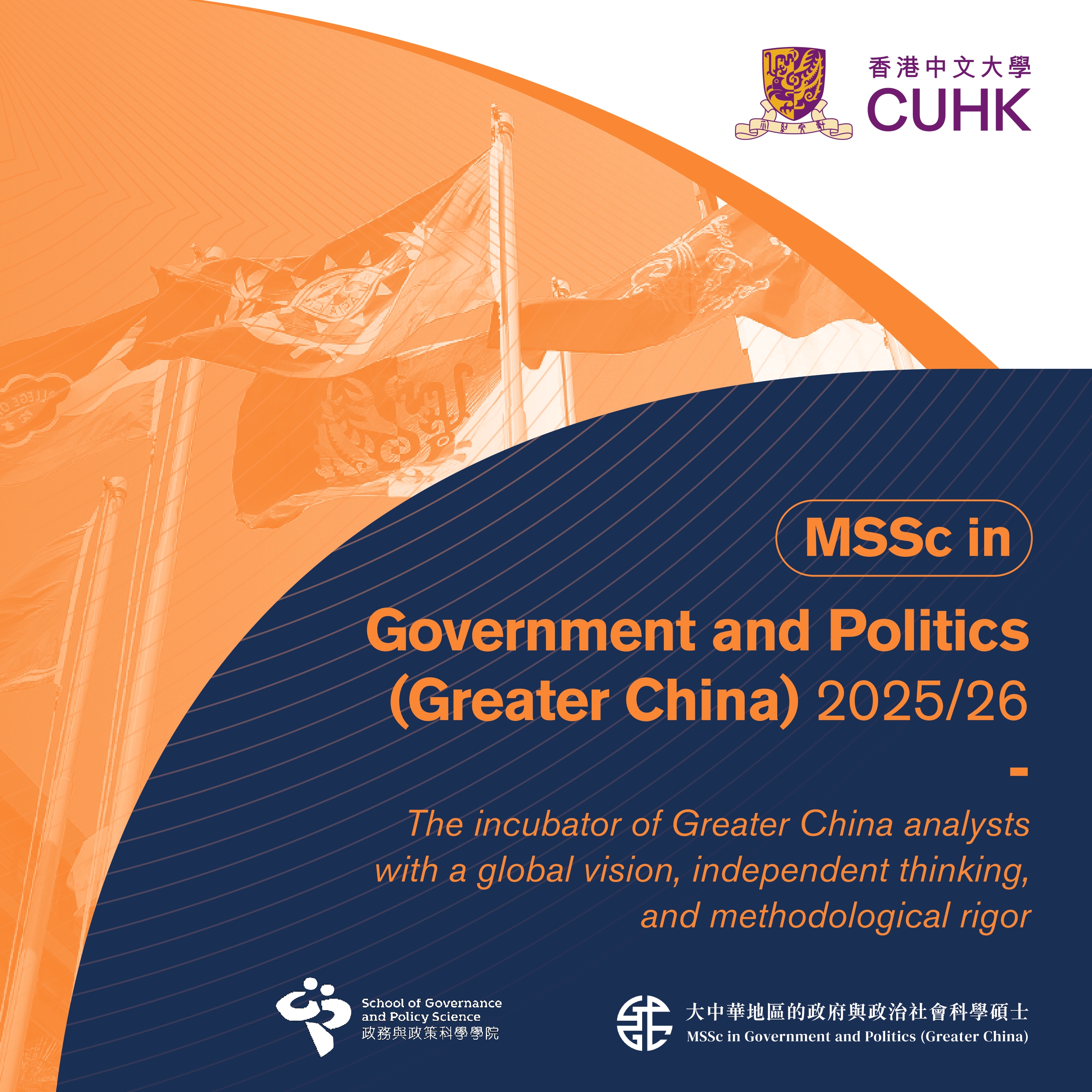Launched in 2012, GPGC aims to train creative and methodologically rigorous analysts of government and politics in Greater China. This taught master’s programme offers advanced training on major issues in Greater China areas, such as political institutions, public administration, political economy, foreign policies & international relations, democracy & rule of law, environmental politics, state-society relations, and political communications. The GPGC programme prepares students for leading roles in public service, third sector, media, education, business management, etc.
GPGC is a taught master’s programme and open to all prospective applicants who are interested in pursuing Government and Politics or Greater China Studies as a second degree. Applicants who hold a bachelor degree in a discipline other than government and politics are also eligible to apply the Programme.
Click here for our Programme Leaflet 2025/26
Programme Highlights
MSSc in GPGC
Has a broader geographical and thematic coverage than most of Master of Art programmes in China Studies. Geographically it covers Greater China (Mainland China, Taiwan, Hong Kong and Macao). Thematically it provides unique insights into major subjects, such as institution & reform, public administration, foreign policies & regional international relations, democracy & rule of law, environmental politics, state-society relations, and political communications.
Emphasizes social science perspective and research methodology
Taught by faculty of the GPA Department and renowned scholars from Greater China and overseas
Offered primarily in English with elective options in Mandarin Chinese. Normally course readings will include both English and Chinese materials.
Programme Objectives
To provide students with a comprehensive understanding of contemporary Greater China from social science (political science in particular) perspectives, and to encourage them to form independent analysis and critical assessment of contemporary Greater China;
To sharpen students’ knowledge of the complex relationships of political, sociological, historical, economic and managerial factors in Greater China through social scientific approaches; and
To enhance students’ sensitivity to the issues generated by the rapid transformations in Greater China societies with a global view.
Study Scheme
Students are required to complete a minimum of 24 units of courses (8 courses):
Required Courses
GPGC5001 Institution and Reform in Contemporary China
GPGC5003 Greater China and the World
GPGC5004 Public Policy and Administration in Greater China
GPGC5005 Methods in Social Science Research
Elective Courses
Any four courses from
GPGC5002 HK, Macao, Taiwan Politics in Comparative Perspective
GPGC5101 Political Economy and Business Environment of Greater China
GPGC5102 Politics of Transition and Greater China
GPGC5103 Anti-Corruption in Comparative Perspective
GPGC5104 Taiwan in Comparative Perspective
GPGC5105 Public Governance and Civil Service in Hong Kong
GPGC5106 State-Society Relations in Greater China
GPGC5107 Environmental Politics of Greater China
GPGC5108 Political Thought in Contemporary China
GPGC5109 Human Rights and Constitutionalism in Greater China
GPGC5110 Selected Topic in Government and Politics of Greater China I
GPGC5111 Political Communication in Practice
GPGC5112 Selected Topic in Government and Politics of Greater China II
MPUP5422 Environmental Policy Analysis
*Elective courses may change from year to year, subject to the availability of teaching resources and student enrollment.
Mode of Study
Mode of Study Normal Study Period Maximum Study Period
Full-time 1 year (2 terms) 3 years (6 terms)
Part-time 2 years (4 terms) 4 years (8 terms)
Graduation Requirements
Students must complete at least eight courses (4 required courses and 4 elective courses) and achieve a cumulative grade point average (GPA) of at least 2.0 to fulfill the graduation requirement.
Language
The medium of instruction for Master of Social Science in Government and Politics (Greater China) is primarily English, with a few elective courses in Mandarin.
2024/2025 Teaching Year
|
September 2024 – May 2025 Please click here link for University Almanac: |


